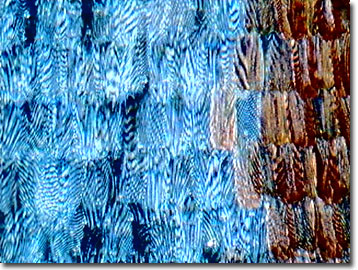Butterfly Wing Scale Digital Image Gallery
White Barred Charaxes Butterfly
The white barred charaxes is one of the fastest flying butterflies in the world, with some reaching speeds of almost 40 miles per hour using their large, strong wings. Typically dwelling in medium and high altitude tropical African forests, members of the species prefer densely wooded areas and often fly high in the tree canopy. Such traits can make the species extremely difficult to catch unless one knows the secret to attracting the elusive butterflies.

Classified scientifically by lepidopterists as Charaxes brutus, the white barred charaxes butterfly joins 156 other African and 23 non-African species in the biologically rich and diverse genus known as the rajah butterflies. A favorite of collectors because of the intricate patterns on their wing undersides, white barred charaxes butterflies display a prominent white vertical stripe on both sides of their wings. As members of the butterfly family Nymphalidae, the butterflies sometimes referred to as white-barred Caraks feature a highly modified first pair of legs that are used for tasting instead of walking.
White barred charaxes caterpillars consume the leaves of mahogany, honeysuckle, Cape ash, and Chinaberry trees. Since larval white barred charaxes feast on economically important tropical timber species, the caterpillars are considered agricultural pests. Consequently, the species is subjected to chemical control by frequent insecticide applications. However, the Cape ash is used as an ornamental tree in many urban areas, a botanical extension that has enabled the white-barred charaxes to thrive in some African countries despite a decrease in its natural habitat.
Harvesting wild butterflies is a lucrative field in Africa, where profits from rare specimen can often sustain large families. The fast speeds and high-flying tendencies of adult white barred charaxes used to make them rare in butterfly collections, but the discovery that the species could be lured to screen traps with baits of dung and fermented fruit has made them much easier to obtain. Although mounted specimens are available commercially, butterfly conservancies allow thousands of people, who may never have the opportunity to enjoy them in the wilds of Africa, to view live specimens.
White Barred Charaxes Butterfly Images in Brightfield Illumination
Wing Scale Array - In brightfield, the wing scales of a white barred charaxes appear smooth and rounded. The scales are also lightly colored, which makes them stand out against a dark, adjacent vein.
White Barred Charaxes Butterfly Images in Darkfield Illumination
Wing Scale Interference Patterns - Some of the wing scales in this image appear blue, while others have a more earth tone hue. Interference patterns that look similar to the dark stripes of zebra cover their surfaces.
Wing Scales and Vein - Several rows of wing scales marked by interference patterns surround a reddish hued vein in this unusual photomicrograph.
White Barred Charaxes Butterfly Images in Oblique Illumination
Wing Vein - The dominant feature of this oblique illumination image is the conspicuous wing vein of a white barred charaxes butterfly. At this high level of magnification the vein looks more like a large pipe than the delicate supportive structure of a butterfly.
Contributing Authors
Cynthia D. Kelly, Shannon H. Neaves, Laurence D. Zuckerman, and Michael W. Davidson - National High Magnetic Field Laboratory, 1800 East Paul Dirac Dr., The Florida State University, Tallahassee, Florida, 32310.
BACK TO THE BUTTERFLY WING SCALE IMAGE GALLERY
BACK TO THE DIGITAL IMAGE GALLERIES
Questions or comments? Send us an email.
© 1995-2025 by Michael W. Davidson and The Florida State University. All Rights Reserved. No images, graphics, software, scripts, or applets may be reproduced or used in any manner without permission from the copyright holders. Use of this website means you agree to all of the Legal Terms and Conditions set forth by the owners.
This website is maintained by our
Graphics & Web Programming Team
in collaboration with Optical Microscopy at the
National High Magnetic Field Laboratory.
Last Modification Friday, Nov 13, 2015 at 01:19 PM
Access Count Since January 21, 2003: 19827
Visit the website of our partner in introductory microscopy education:
|
|
